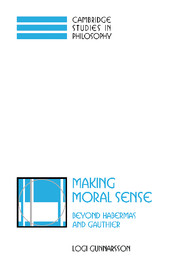Book contents
- Frontmatter
- Contents
- Preface
- PART I PROBLEMS
- PART II AGAINST RATIONALISM
- 6 Gauthier's contractarianism
- 7 From here to pre-social agreement
- 8 Habermas' discourse ethics
- 9 Discoursing about discourse
- PART III FOR THE SUBSTANTIVE APPROACH
- PART IV FOR PARTICULARIST SUBSTANTIVISM
- Appendix Transcendental vs. universal pragmatics
- Bibliography
- Index
7 - From here to pre-social agreement
Published online by Cambridge University Press: 22 September 2009
- Frontmatter
- Contents
- Preface
- PART I PROBLEMS
- PART II AGAINST RATIONALISM
- 6 Gauthier's contractarianism
- 7 From here to pre-social agreement
- 8 Habermas' discourse ethics
- 9 Discoursing about discourse
- PART III FOR THE SUBSTANTIVE APPROACH
- PART IV FOR PARTICULARIST SUBSTANTIVISM
- Appendix Transcendental vs. universal pragmatics
- Bibliography
- Index
Summary
THE PURE UTILITY MAXIMIZER'S INITIAL SITUATION
If people were to bargain about the distribution of benefits in the current situation, some people would have better bargaining positions than others. What about Gauthier's initial situation? Do some people in that situation have a better bargaining position than others? The answer is “yes.” Gauthier's Lockean proviso, which defines the rights that people have in the initial situation, allows you to make yourself better off than another person prior to making the social contract assuming that you “[d]o not make yourself better off than you would have been in someone else's absence, by making that person worse off than he would have been in your absence.” Thus, the naturally better endowed are permitted to enhance their bargaining positions as long as they do not thereby violate this proviso. Now the question is whether the situation in which the last renegotiations take place is also a situation in which the naturally better endowed have a better bargaining position. If not, then Gauthier's renegotiation argument fails to justify the initial agreement to people in the present situation.
The renegotiation argument is addressed to utility maximizers in the current situation who also want no one to be coerced. One of these utility maximizers – call her “the pure utility maximizer” – may argue that the repeated negotiations would not lead to Gauthier's initial situation. According to her, Gauthier gives the naturally better endowed something for free that should itself be subjected to utility maximization considerations.
- Type
- Chapter
- Information
- Making Moral SenseBeyond Habermas and Gauthier, pp. 71 - 85Publisher: Cambridge University PressPrint publication year: 2000



